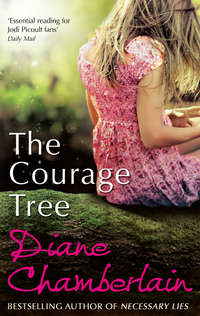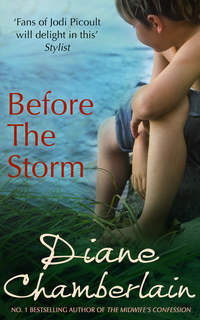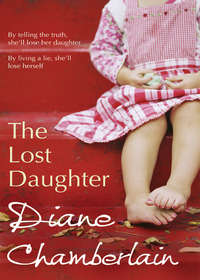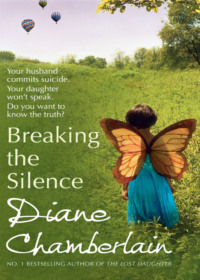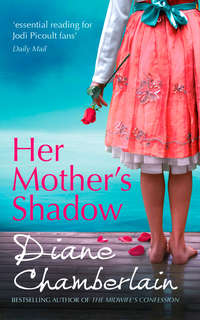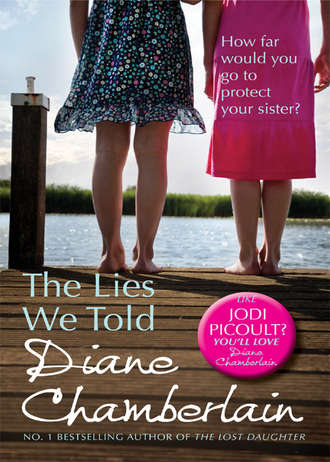
Полная версия
The Lies We Told
I drew in a breath of surprise. The urge to tell him my own story expanded in my chest, but it was a story I never told. “Both at once?” I asked. “An accident?”
“Exactly. They were coming back from a party. Drunk driver.”
“Oh, I’m so sorry,” I said. “Did you live with relatives then?”
“Didn’t have any of them, either. Just grandparents who were too frail to take me. So I did the foster home thing.”
“Was it hard?” I’d been spared foster care. I ate a spoonful of the stew. I loved Mama Dip’s Brunswick stew, but now I barely tasted it.
“I got into a good one,” he said, blotting his lips with his napkin. “Unusual to be able to stay in one foster home for years, but I did. I’m still in touch with them. Good people.”
“You’re so—” I smiled “—upbeat.”
“Just born that way.” He shrugged. “Extra serotonin or something. It got me through.”
I ate another spoonful of stew, still not tasting it. “I was fourteen,” I said.
“Fourteen?”
“When my parents died.”
He set his fork down and leaned back in his chair. “You’re kidding,” he said. “You, too? An accident?”
I hesitated. I didn’t want to go there, much as I longed to tell him every detail of my life. “Yes,” I lied.
“Did you end up in foster care, too?”
“No.” I looked down at the stew. “Rebecca—my sister—was eighteen, and she wouldn’t let it happen. She took care of me. She made it work.”
“You were lucky.”
“Incredibly.”
“Where does your sis—Rebecca—live when she’s not on assignment?”
“Here. Well, in Durham. She lives with Dorothea Ludlow. Do you know who she—”
“The DIDA founder,” he said. “Cool lady. Your sister lives with her? She’s her—” He raised his eyebrows. Clearly he did know about Dorothea.
“No. Dorothea’s in a committed relationship with an artist named Louisa Golden. They have this beautiful Victorian, and Rebecca rents the upstairs.”
“What’s your relationship status?”
“You are so blunt.” I smiled. “You just … you think of a question and it pops out of your mouth.”
“Does that bother you? ”
I thought about it. “I like it, actually,” I said, “and I’m not in a relationship. ”
“Amazing,” he said. “You’re pretty and smart and a catch. You’ve been working too hard, huh?”
People always said I was pretty, which meant average looking, which was good enough. Rebecca was beautiful though, and a force of nature. There were pictures of her on the DIDA Web site working in the field. No makeup, her short brown hair messy and unkempt, a sick child in her arms. The image of her could take your breath away. Even though I was the blonde, blue-eyed, creamy-skinned sister, I seemed to disappear next to her. It had sometimes been hard growing up in her shadow.
“How about you?” I asked.
“Divorced. Two years ago. Super woman, but she changed her mind about wanting kids.”
“You mean … changed her mind which way?”
“We went into it—we were married four years—we went into it talking about having a couple of kids. Several, really. Had the names picked out. All that rose-colored kind of fantasizing. I crave family, for obvious reasons.”
I nodded. I understood completely.
“Frannie was a reporter for one of the TV stations in Boston. She got caught up in her career and just totally changed her mind. It was bad. Hard when you still love each other and get along well and all, but can’t agree on that basic, really important issue. Not something you can really compromise on, you know? Either you want kids or you don’t.”
“I do,” I said, blushing suddenly. It sounded as though I was offering myself to him for something more than dinner. “I mean—” I laughed, embarrassed “—I feel the way you do. I have no family except for my sister. It’ll be a challenge balancing kids and work, but it’s a priority.”
For the first time that evening, he seemed at a loss for words. He chewed his lower lip, gazing at his nearly empty plate, but the silence wasn’t uncomfortable. My embarrassment had vanished, and I felt something happening between us in that silence. A shift. A knowing. When he looked up again, it was clear he felt it, too.
“You said I’m blunt.” He was smiling.
“Well, I didn’t mean—”
“I’m going to be even more blunt right now,” he said. “I fell in love with you in the O. R. today.”
I laughed. He was crazy. “You don’t know me,” I said.
“So true. So true. I sound like an idiotic kid, huh? But I fell in love with what I did know. What I witnessed. Your skill and caring.”
“Maybe you’re one of those men who can’t stand to be without a partner,” I said, but I knew where this was going. Where I wanted it to go.
“I’ve been without a partner for two years,” he said. “I’ve had opportunities. I haven’t been interested. Till right now. Today. But I don’t want to freak you out, okay? I won’t stalk you. Won’t call and bug you. I’ll leave the ball in your court.”
“Maybe you connect to people too quickly,” I said, thinking of the housekeeper in the elevator. “You assign them a personality before you get to know what they’re really like.”
“See?” He grinned. “You’re already finding fault with me, just like in a real relationship.”
I laughed. Could he be anymore likable? But then I sobered. I looked at him across the table.
“I lied to you earlier,” I said.
He raised his eyebrows. “What about?”
“I just … you’ve been so open. And this is a big part of who I am, so—”
“You don’t need to tell me.”
“I want to,” I said, knowing it was only a half-truth I was about to reveal. “Because I’m not … I’m a complicated person, and you should know that before you sign on.”
He laughed. “It’s not like I’m buying a house here and you need to disclose all its flaws.”
“Don’t make this hard,” I said, and I must have sounded very serious, because his smile disappeared.
“Sorry. Go ahead.”
“My parents didn’t die in an accident.” I looked down at the table. Pushed the handle of my knife back and forth. “They were murdered.”
“Ah, no.”
I couldn’t look at him. “I don’t like to talk about it, okay?” I said. “Just … they were. And it shook me up. Made me afraid of. certain situations where I don’t feel safe.” If Rebecca had been sitting with us, she’d be kicking me under the table. Never let them see you sweat. That was her motto.
“Of course it did.” He reached across the table and rested his hand on mine. “Did they catch the guy? I assume it was a guy?”
I nodded. “They caught him and killed him in a shootout.”
“What was his motive?”
“He was a disgruntled student of my father’s.” How often I’d heard those words, disgruntled student. I could rarely hear one without adding the other in my mind. “My father taught philosophy at American University.” I wrinkled my nose. “Can we not talk about this anymore?”
“We’re done.” He nodded. “I just want you to know
I’m sorry.”
“Thanks.”
“And you’re sweet to want to do the full-disclosure thing.” He smiled again, and this time I returned it. “Makes me fall even harder for you, Dr. Ward.”
“I’m … a little overwhelmed by tonight,” I admitted. “Of how fast this seems to be going. People turn out not to be who you think they are at first.”
“Very true,” he said. “So we could avoid any pain down the road and not see each other again. Or we can take the risk and go with how really, really good this feels.”
I wasn’t much of a risk taker. I wished I could talk to Rebecca. I had other friends I could call for advice and commiseration, but it was Rebecca who had my heart, and Rebecca was in China, where her cell phone didn’t work. I would, for a change, have to be my own counsel.
“Let’s go for it,” I said, and I lifted my glass of lemonade for a toast.
4
Rebecca
“WHAT’S WRONG?” BRENT FROWNED AS REBECCA WALKED into his hotel room.
“Maya lost another baby.” She flopped onto the edge of his bed. She could usually shrug off bad news. Compartmentalize it and move on. She had to be able to do that in order to work for DIDA and maintain her sanity. But for some reason, this latest miscarriage was really getting to her.
“She was pregnant again?” Brent sat down next to her. “Did you know?”
“I knew, but no one else did. They were afraid to tell anyone after the last miscarriage. She made it sixteen weeks this time.”
“Man, that sucks.” Brent nuzzled her neck. “Let me make you feel better.”
She jerked her head away. “I can’t shift gears that fast, Brent,” she said. “All I can think about is Maya and Adam. I feel like a crappy sister. Like maybe I should go home and be with her.”
“Do I need to remind you you’re the speaker at lunch tomorrow? And the presenter at the … that afternoon seminar, whatever it is?”
“I know.”
“It’s not like someone died,” he said.
She looked at him sharply. “It’s exactly like someone died.”
The night table lamp picked up two sharp lines between his eyebrows. “How can you be pro choice and say that?” he asked.
“Oh, stop it. This is different. This was a sixteen-week-old much wanted baby with a perfectly healthy mother. It’s a death to Maya and Adam.”
“And apparently to you, too.”
“Because of how it hurts Maya.” Even as she said the words, she knew it was more than that. She’d wanted that niece or nephew. She wanted to be the cool aunt who’d bring gifts from all over the world. The aunt her niece or nephew could confide in, knowing nothing would ever make her blush. She’d wanted to hold Maya’s baby in her arms.
Brent sighed and got to his feet, slipping his hands into his pockets. He looked through the sliding glass doors to the small balcony and the view of San Diego harbor. “You infantilize Maya,” he said.
She could see his reflection in the sliding glass door. “What do you mean?”
“I mean, you still think of her as your baby sister who needs your protection. She’s a grown woman.” He turned to face her, the lines still carved into the skin between his eyebrows. “She’s a physician, for Christ’s sake.”
“Don’t you ever feel protective of Brian or Kristin?” she asked. Brent was the oldest of three.
He laughed. “Hell, no. They were a pain in the ass when we were growing up and they’re still a pain in the ass now.”
“But you love them.”
“Of course. I just don’t dwell on them. They’re adults who can stand on their own two feet.”
She wished she could feel as relaxed about Maya as Brent did about his siblings, but Maya was needy and it was Rebecca’s fault. As simple as that.
“If I marry you,” Brent said, “I’m marrying Maya,
too.”
“Don’t be so dramatic.”
“You’re the one who’s being dramatic.” Brent walked over to the mini-refrigerator, opened the door and pulled out a beer. “Want one?” he asked.
“Uh-uh.”
Brent uncapped the beer. “You want to go over your speech for tomorrow?”
She ran her hand over the fern pattern on the bedspread, smoothing the already smooth fabric. “I could do it in my sleep.”
“All right.” He took a swallow from the bottle. “I get that you’re annoyed with me. Let’s just forget about sex tonight and chill. Watch TV. Maybe a movie.”
She was too antsy to watch a movie. She thought of going for a run instead, but it was getting late and she didn’t feel like changing into her running clothes. She let out a sigh as she kicked off her shoes and drew her feet onto the bed. “Okay,” she said.
She let him pick the movie—a Denzel Washington flick—and they leaned back against the headboard of the bed, at least two feet of king-size green-and-white bedspread between them. She couldn’t concentrate. She thought of Maya giving Adam the news. Crushing him with it. Had she told him over the phone? Waited till he came home? She tipped her head back, resting it against the headboard, and stared at the dim ceiling. Brent had to know she was still upset, but he was fed up with her and she didn’t really blame him.
She didn’t know what she wanted from him tonight. It wasn’t that she needed to talk more about Maya and Adam and their lost child. Their lost hope. She just wanted him to comfort her. He wasn’t that kind of man, though. One of the things he always said he liked about her was that she never let things get to her.
What if she married Brent and something terrible happened? What if Maya died? No. She couldn’t go there. What if Dorothea died? Would he tell her to keep her chin up? Change the subject? Drink a beer? Turn on a damn movie? Could the two of them ever run DIDA together without screwing it up because of their bickering? She let out her breath in frustration.
“What?” he asked.
“What do you mean, ‘what’?”
“You just huffed.”
“Oh. Nothing.” She couldn’t talk to him about it. He wouldn’t understand. Besides, he’d already returned his attention to the movie.
She glanced at the clock on the night table. Ten-thirty. One-thirty in Raleigh. She hoped Maya was able to sleep. She pictured her wrapped in Adam’s arms. Now there was a guy who knew how to comfort someone! Thank God he hadn’t decided to come to the conference. He was now a DIDA volunteer as well, although he hadn’t yet been called to a disaster site. She and Brent had talked him into signing up the year before. He hadn’t needed much persuading in spite of the fact that Maya’d been unhappy with his decision. She was worried enough when Rebecca was in the field; she didn’t want to have to worry about Adam as well.
“Every time the phone rings,” Maya had once told her, “I’m afraid it’s going to be Dorothea telling me you were killed by a gang of thugs or an earthquake aftershock or a disease from drinking filthy water.” Maya’s worry about her was irrational, but not totally over the top. Rebecca had been shot at once in Africa, although she’d never told Maya about that, and she’d had more than a few run-ins with parasites.
Two years ago, she fell down the stairs at Dorothea’s and broke her arm. Maya met her in the E. R., and Rebecca was able to make her point: “I’ve never once been injured on a DIDA mission,” she’d said, fighting the pain as the E. R. doc splinted her arm. “It’s home that’s dangerous.”
Denzel was running through the darkness with a gun in his hand. Rebecca had no idea who he was after or why, nor did she care.
“You huffed again,” Brent said, without shifting his gaze from the screen.
“Excuse me for living.”
He grabbed the remote from the bed and hit the mute button. “What is your problem?” he asked.
She shifted on the bed so that she was facing him. “What if we got married and something terrible happened?”
“You said you don’t want to get married.”
“Hypothetically. What if Dot died? Or your sister or brother? Would you shrug it off like this?”
Brent stared at her for at least five long seconds. Then he sighed, rubbing his forehead with his palm, and she knew she’d finally gotten through to him. “Of course not,” he said softly. “Whatever happens, we’d be there for each other. We’re great together, Bec.” He reached for her hand, lifting it to his knee. “We’d do DIDA till we keeled over of old age. The cool thing about you … about both of us … is that we’ve always been able to roll with the punches, no matter what’s happening around us. We’re survivors. That’s why DIDA suits us.” He leaned over to kiss her. “I love you, Rebecca. Don’t you get that?”
She nodded, and he wrapped his arms around her. Resting her forehead against his shoulder, she suddenly pictured herself holding Maya’s healthy, full-term baby, pressing the infant close to her chest, and she felt a loss so sharp and deep it made her gasp.
She jerked away from Brent.
“What’s wrong?” he asked.
She stood up, rubbing her arms. The room was cold, the sound from the TV too loud. “I don’t know what’s with me tonight,” she said. “Sorry I’m being weird. I’m going out on the balcony to smoke.”
“Want me to pause the movie?” Brent asked as she slid the glass door open.
She shook her head. “I can’t concentrate. Just let it run.”
She carried her cigarettes and lighter out to the balcony and sat on the chair overlooking the harbor, trying to shake off the unexpected sensation of losing something precious. Above her, the sky was filled with stars, and below her, lights flickered in the boats lining the piers. She couldn’t blame Brent for being irked by her tonight, she thought as she lit a cigarette. She wasn’t usually like this. It was as though Maya had crawled under the surface of her skin and she couldn’t simply brush her off.
Maybe Maya and Adam would get serious about adoption now. Maya would eagerly adopt, but Adam desperately wanted his own biological child. He’d be such a joyful father, either way. He’d cook for his kids. Make pancakes in the shape of animals, with Maya watching him, smiling, totally in love with her husband and their brood. Adam was equally smitten with Maya.
You only needed to be with them for two seconds to know he adored her. Why did Maya get to be loved like that and she didn’t? The thought made her feel small and churlish. She’d felt that way ever since they were kids, when Maya’d received their father’s attention at every turn. Maya had been so much like him—bookish and studious—while Rebecca had their mother’s vitality and spunk. Rebecca’d always been certain of her mother’s love, but it was her father’s she’d craved, and that seemed out of reach. “I have a scholar and an athlete,” he’d say of his two daughters, as though he valued them equally, but everyone knew which daughter he favored. Rebecca was smart, but Maya was smarter. Maya could sit still for hours, with a focus that was uncanny for a child. Their father would read to them in bed, and although Rebecca would try her best to pay attention, she could never make it to the end of a story. “You have ants in your pants?” he’d ask her with a resigned smile, and she’d nod, hopping out of the bed to play with her trucks or run around the house with her arms outstretched, pretending she was an airplane, leaving her younger sister behind to bask in their father’s love.
Rebecca blew a stream of pale smoke into the darkness, resting her head against the back of the seat. She hated when she relived the past as though it mattered, nursing an ancient jealousy over her sister’s treatment when they were kids. The truth was, they’d both suffered the same loss. If Maya was lucky enough to find a guy like Adam, Rebecca wanted to be happy for her.
That was part of the problem with her and Brent, wasn’t it? If she was ever going to get married, she should feel about a man the way Maya felt about Adam. So she and Brent were disaster junkies. Big deal. That didn’t feel like enough.
She stubbed out her cigarette on the concrete balcony, then turned to look through the sliding glass door. She could see Brent, the changing colors of the TV screen altering his features second by second. His eyes were wide, absorbed by the movie.
“Rebecca’s type triple A,” he’d said once, when they were out with friends, and she knew he meant it as a compliment. “You should see her in the field,” he’d added. “She never sleeps.”
She’d felt his admiration then. His love. He did love her. She had no doubt of that. What the hell more did she want?
5
Maya
THEY KEPT ME OVERNIGHT AFTER THE D AND C BECAUSE Elaine was concerned about the amount of bleeding I was having, but by morning I was doing much better. Physically, anyway. The nurse wheeled me outside to the sidewalk deck where two other women sat in wheelchairs, waiting for their rides home. I was relieved that neither of them had a baby in her arms. I would have lost it.
The woman in the next chair looked vaguely familiar, and I wondered if she was the mother of one of my young patients. I often bumped into them without having a clue who they were, although I would recognize their children anywhere.
Adam pulled up in his silver Volvo and got out. He was pale, his face drawn and tight. The nurse bent over to lock the brakes on the wheelchair, and just as I was about to stand up, the woman who looked familiar spoke up.
“Adam!” she said, and I instantly realized who she was: Adam’s ex-wife, Frannie. The one who’d decided she didn’t want children. I’d seen pictures of her in Adam’s old photo album. She lived in Boston, though, and I couldn’t imagine what she was doing next to me on the parking deck. I sank back into the wheelchair.
“Frannie!” Adam exclaimed with his usual effervescence in spite of the circumstances. The tight expression on his face vanished with a smile. He walked to the side of my chair, resting his hand on my back. “Maya, this is Frannie, my ex-wife. Frannie, this is Maya, my—”
“Current wife.” Frannie laughed. She had pretty teeth and thick, curly brown hair, but she looked as exhausted and pale as I felt. “Nice to meet you, Maya,” she said. “Though I feel like I’ve been run over, and you probably do, too.”
I nodded with a small smile. All I wanted was to get home and into my own bed.
Adam left my wheelchair to open the passenger door of the car. “So …” He looked at Frannie with a puzzled smile. “What are you doing in Raleigh?”
“My husband, Dave, put in for a transfer with IBM,”
Frannie said, “and we moved here last year. Better weather. Better for the kids.”
“Kids?” Adam had been reaching for my arm to help me stand up, but his hand stopped in midair.
Frannie laughed again. “I know, I know.” She ran a hand through her curls. “Don’t give me a hard time about it. I changed my mind about having them after all. We’ve got two. Just had my tubes tied, though. Two is plenty. They’re a handful.”
“Adam,” I pleaded, and he reached down again to take my arm. I let him guide me into the car, the muscles in my thighs quivering. He closed the door behind me, shutting out the rest of his conversation with the woman he’d left because she wouldn’t have children and who now had two while I—and he—had none.
It was another minute before he got into the car himself. He turned the key in the ignition, then glanced over at me. “Seat belt,” he said.
I buckled myself in and he pulled away from the curb.
“How do you feel?” he asked. “Do you want me to stop at the store for anything on the way home?”
I shook my head. The ache in my throat dwarfed the dull pain in my uterus. “If you’d stayed married to her, you’d have children now,” I said.
“Maya, don’t.”
“How can I not?”
“I’m not married to her. I don’t love her any longer. I love you.”
“But if you’d stayed married to her—”
“Stop it.” He turned the corner with such force that we nearly ran over the curb, and I reached reflexively for the dashboard.
I pounded my fist against the car door. “What’s wrong with me?” I asked the air. “Why is it so hard for me to have a baby when every other woman on earth can have as many kids as she likes?”
“That’s bullshit. You have plenty of company and you know it. Please stop beating yourself up over this.”
“Every single one of my friends has kids now,” I said. “I’m cut off from all of them. I buy them baby gifts. I try to keep up the friendships and I know they try, too, but it’s impossible. They have nothing in common with me anymore. They pity me.”
“Right now, you’re pitying yourself,” he said.
“Well, so what?” I snapped, hurt. “When do I ever pity myself? Let me have five minutes of self-pity, okay?”
We never argued. Never. Yet this felt strangely good and necessary. Cleansing, in a way. But when we came to a stoplight and I glanced over at him, I saw how tired he looked. I saw the lines that creased his forehead. The pink cast to the whites of his eyes. This was not only my loss.
I reached over. Rested my hand on his biceps. “Adam,” I said. “I’m sorry.”



